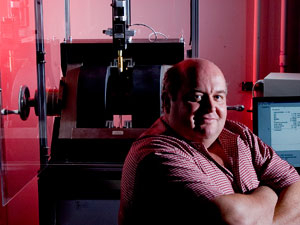Seagate Technology LLC has donated sophisticated research equipment, designed to measure and characterize magnetic materials and devices, to the University of Houston Cullen College of Engineering’s Center for Integrated Nanosystems.
A leading manufacturer of digital storage solutions and hard drives, Seagate donated both an alternating gradient force magnetometer (AGFM) and the high field vibrating sample magnetometer (VSM) earlier this month. The lab equipment—valued at roughly $400,000 new—is not only expected to boost research productivity by cutting the time required for nanomagnetic device testing, but allow researchers to achieve higher sensitivity measurements than what’s been capable on site to date.
“This donation makes the available toolset for magnetic device and materials characterization complete, rivaling many of the magnetic device characterization laboratories worldwide,” said Dmitri Litvinov, director of the Center for Integrated Nanosystems and professor of both electrical and computer engineering and chemical and biomolecular engineering. “The new acquired research capacity gives us the ability to significantly advance many of our projects in areas that were previously out of reach without the access to these instruments. That’s all thanks to Seagate.”
Litvinov, who worked at Seagate for five years before joining UH faculty in 2003, is currently partnering with their staff on three National Science Foundation funded projects related to nanomagnetics research.
The two machines, used for measuring the basic magnetic properties of materials, and a third Vibrating Sample Magnetometer given in 2003, brings Seagate’s recent donations for the center to near $600,000.
Prior to the machines’ arrival, measurement sensitivity limitations made the characterization of small arrays of nanomagnetic devices impossible and also halted further testing of advanced magnetic materials under development in their nanoscale bit-patterned recording medium applications. The increased sensitivity of the AGFM combined with the VSM’s superconducting magnet quadrupling the magnetic field available for measurement will alleviate these earlier roadblocks, Litvinov said.
Both instruments will greatly benefit multiple research projects being conducted in the Center for Integrated Nanosystems. These include the development of a nanomagnetic biosensor technology platform for use in biosafety and medical applications and a nanoscale bit-patterned magnetic recording medium—aggressively being pursued by the $100 billion magnetic recording industry—that could transform the next generation of magnetic data storage.
